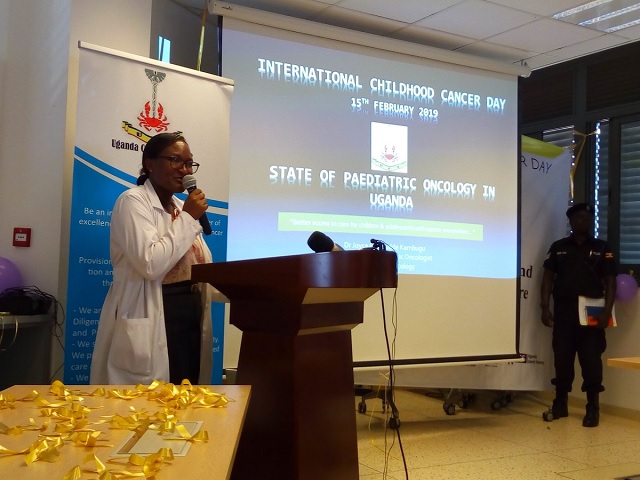
Kampala, Uganda | THE INDEPENDENT | Alice Nankinga, 22, had a sunny personality which classmates, friends and family keep referring to while reflecting on the past before she was diagnosed with Cancer. But her dreams and happiness were shattered when, while in senior one, she frequently fell sick.
Six years later, Nankinga was diagnosed with ovarian cancer, a pronouncement that sounded like a death sentence, according to her. “I did not know that it was the beginning of a big battle. I knew it was time for me to get ready to fight, each day came with its own problems,” Nankinga told Uganda Radio Network.
Nankinga went through all stages of cancer treatment until her uterus was removed to stop cysts from growing further. She now advises other people suffering from cancer to never give up, and stay positive because attitude and hope are a key catalyst for cancer management.
“I thought it was the end for me… This was more than I was ready for but I still decided not to give up ovarian cancer could take me,” Alice recalls.
Today, she was one of the survivors who converged at the Uganda Cancer Institute in Mulago to commemorate international childhood cancer day, marked around the world each year on February 15. The day seeks to increase public awareness on childhood cancers and to express support for children and adolescents with cancer, survivors and their families.
Each year, more than 300,000 children aged below 19 are diagnosed with cancer around the world. Approximately 8 in 10 of these children live in low and middle-income countries where their survival rate is often near 20 percent. This is in stark contrast to high-income countries, where cure rates exceed 80 percent for many common childhood cancers.
Records at the Uganda Cancer Institute indicate that cancer is now affecting more children than other common infections in the country, from an incidence rate of 400 new cases in 2015 to 490 in 2016 and 512 cases in 2017. The disease is estimated to be affecting 7,000 children in Uganda today. The most common cancers in children are cancers that affect the muscles, kidneys and lymph nodes.
Dr Joyce Balagadde Kambugu, the head of pediatric oncology at Uganda Cancer Institute encourages the parents and caretakers to ensure that children enjoy the right to early and proper diagnosis. He says that like all cancers, children can be treated if the problem is detected early. She says cancer today is affecting more children than HIV.
But Dr Kambugu says that childhood cancers have higher chances of cure. She says the cure is only compromised as a result misdiagnosis which subjects patients to improper treatment and ultimately delays the needed treatment, lack of facilities and manpower with a specialty in managing and treating cancers.
Uganda Cancer Institute, for instance, does not have an independent theatre for children with cancers. They depend on the general theatre at Naguru Hospital which sometimes affects the treatment cycle of children awaiting surgery as priority is given to emergency conditions.
Brenda Natukunda, a parent whose four-year-old daughter is battling leukaemia at the Uganda Cancer Institute narrates how constant headache, cough, difficulty in breathing, loss of appetite and fever preceded the diagnosis dominated by blood deficiency.
She, however, expresses reservation on the success of the treatment cycle and has a loss of hope despite signs that the child is responding to treatment.
Across the world, activities were organized to reflect on the global goal of reducing childhood cancer mortality and the elimination of cancer-related pain and suffering and achieve at least 60 percent survival for all children diagnosed with cancer around the world by 2030.
Health rights advocates are also using the day to ensure that once diagnosed, children must enjoy the right to access life-saving essential medicines, the right to appropriate and quality medical treatments, the right to treatment without pain and suffering and when a cure is not attainable, the right to a pain-free death.
******
URN
 The Independent Uganda: You get the Truth we Pay the Price
The Independent Uganda: You get the Truth we Pay the Price





